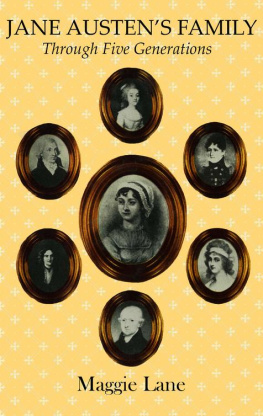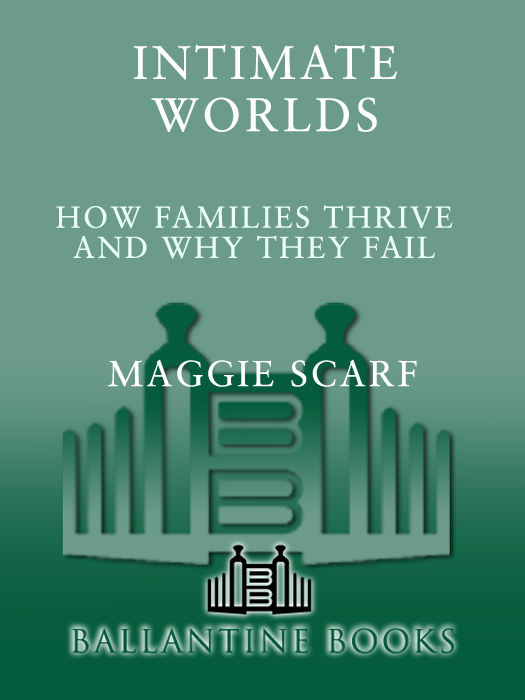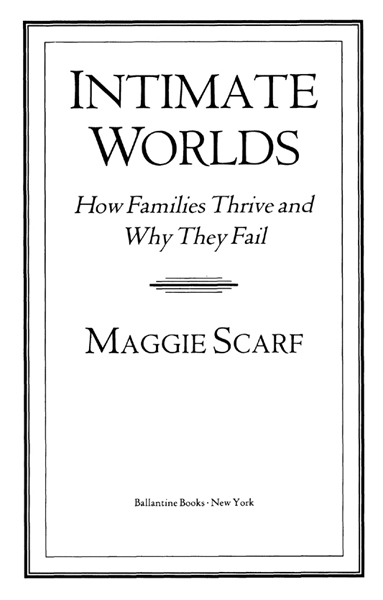More praise for Intimate Worlds
With characteristic intelligence and compassion, Maggie Scarf guides us through that most daunting of territories, the family.
Peter D. Kramer
Author of Listening to Prozac
Rich with Scarfs characteristic good-natured intelligence, her rare combination of level-headedness and passion. Scarf excels in tracing the byzantine, often surprising ways in which family legacies are carried or discarded.
The Philadelphia Inquirer
A humane and sensible book that should be required reading for politicians who run on family values and those who vote for them.
Houston Chronicle
Enlightening Combining interpretive analysis and case studies, and distilling a large body of research and clinical experience, the book should be as popular as her bestselling Intimate Partners.
Publishers Weekly
Fascinating One is both entertained and taught.
Book Page
A therapeutic agenda for improving home life The authors candor and sensitivity ensure that readers will find her a trustworthy guide to a more rewarding family life.
Booklist
BY MAGGIE SCARF
Body, Mind, Behavior
Intimate Partners
Unfinished Business
Copyright 1995 by Maggie Scarf
All rights reserved under International and Pan-American Copyright Conventions. Published in the United States by Ballantine Books, a division of Random House, Inc., New York, and simultaneously in Canada by Random House of Canada Limited, Toronto.
This edition published by arrangement with Random House, Inc.
http://www.randomhouse.com
Library of Congress Catalog Card Number: 96-97085
eISBN: 978-0-307-77564-1
v3.1
It is to my husband, Herb,
the beloved pal of a lifetime,
and to the family that we created together,
that this work is lovingly dedicated.
Authors Note
The families whose interviews have been used in these pages have agreed to let their stories be told, with minor changes as far as identifying details (names, geographical locations in some cases, wifes or husbands profession, etc.) are concerned. The family stories described here are, therefore, factual, aside from the omission or change of such unnecessarily specific and revealing information.
Acknowledgments
How, on looking closely at a wide range of different kinds of families, can one go about teasing out those factors associated with family health and happiness, as distinct from those factors involved when the members of the family are feeling miserable and the system itself is functioning poorly? This is clearly one of the most basic questions to be asked about the familyand yet, until my path happened to cross that of Dallas psychiatrist Leonora Stephens, I hadnt been able to focus upon it with clarity and precision, nor had I realized that one could actually address and answer it in a straightforward, systematic way.
It was Leonora Stephens, then training director of the Southwest Family Institute of Dallas (she is now in private practice and is also associate professor of psychiatry at the University of Texas Southwestern Medical School), who first introduced me to the Beavers Systems Model; and it is she who has, over the subsequent seven-plus years, helped me to truly comprehend this empirically tested scale of family competence and well-being in ever greater depth and detail. And, in the course of what has become a very long, important, and warm association, Leonora Stephens has truly been there for mea kind, patient guide, and the smartest, most perceptive of mentors. To be candid, I find it hard even to imagine what this long process of interviewing, researching, and writing about families would have been like without Leonora Stephenss remarkably astute, discerning, and supportive presence throughout. I am deeply, deeply grateful to her.
I am also profoundly obliged to another crucially important friend and mentor, psychoanalyst John Zinner, M.D. Dr. Zinner, who is on the faculty of the Washington School of Psychiatry and maintains a private practice in Bethesda, Maryland, is one of the founders of the object-relations approach to family treatment. It was under Dr. Zinners brilliant tutelage that I began to fully grasp the ways in which outer presencesactual relationships weve had with significant people in our livesare internalized as inner presences, which are often remarkably influential in shaping our present-day existence. It was he, too, who taught me to recognize that the family group can, like the individual person, become gripped by unconscious fantasiesbasic, unquestioned assumptions that result in the repetitious playing out of old agendas deriving from the parents own pasts in their families of origin. My hope is that what I learned from John Zinner, in what was a school for one, is faithfully reflected in the pages that follow.
I would also like to offer a collective acknowledgment of my gratitude to the entire faculty of the Washington School of Psychiatry. The Washington school is the intellectual hub of object-relations family theory and therapy in this country, and this remarkable group of clinicians, teachers, and researchers (some are all three simultaneously) welcomed me into their midst and made me feel like one of the family. The important connections that I forged at the Washington School of Psychiatry have proven crucial to my thinking not only about families in general, but about the family I myself grew up in, and the family world that my husband and I created together.
Although everyone associated with the Washington School was extremely generous in offering me assistance, there is one particular person who merits especially enthusiastic words of appreciation. This is Hannah Fox, M.S.W., C.S.W., who is now the director of the Metropolitan Center for Object Relations Theory and Practice and a clinician in private practice in New York City and Teaneck, New Jersey.
During the final years of my work on this book, Hannah Fox and I met on a regular basis to talk about the families I was then interviewing. These discussions proved not only fascinating to me personally, but also integral to my understanding of the hidden forces at play in the life of the family. In truth, I never left Hannah Foxs presence without carrying away with me some truly novel, unexpected, and thoroughly intriguing ways of thinking about families.
From the very outset of this engrossing project, I was also meeting regularly with a highly experienced, thoroughly knowledgeable family therapist named Katherine E. B. Davis. Katherine Davis, M.S.W., C.S.W., is now in private practice in New Haven, Connecticut, but she was for many years the clinical director of the Hamden Mental Health Center. With her, as with so many of the other experts I came to know throughout the course of this work, I shared that wonderful mixture of common interests, mentoring, and friendship. She kept me steadfastly on track in terms of thinking systemicallystaying well aware, for example, of the subtle manner in which one family members apparently senseless, self-destructive behavior often served a protective, equilibrium-maintaining function for the system as an emotionally bonded and interconnected entity.
Another much appreciated facilitator, also present from the very beginning of this endeavor, was New Haven psychologist Robert A. Horwitz, Ph.D. With the permission of the families he was treating, Dr. Horwitz, then president-elect of the Connecticut Psychological Association, invited me into the sanctum of his consulting office to meet with them along with him. The passionate intensity of such clinical encounters with all or most family members present is, I hope, accurately depicted in Part Two, where one of the families he and I saw together over the course of a year, the Maguires, is discussed at length. (See Level 4: The Polarized Familythe Tyrant and His Subjects.)











